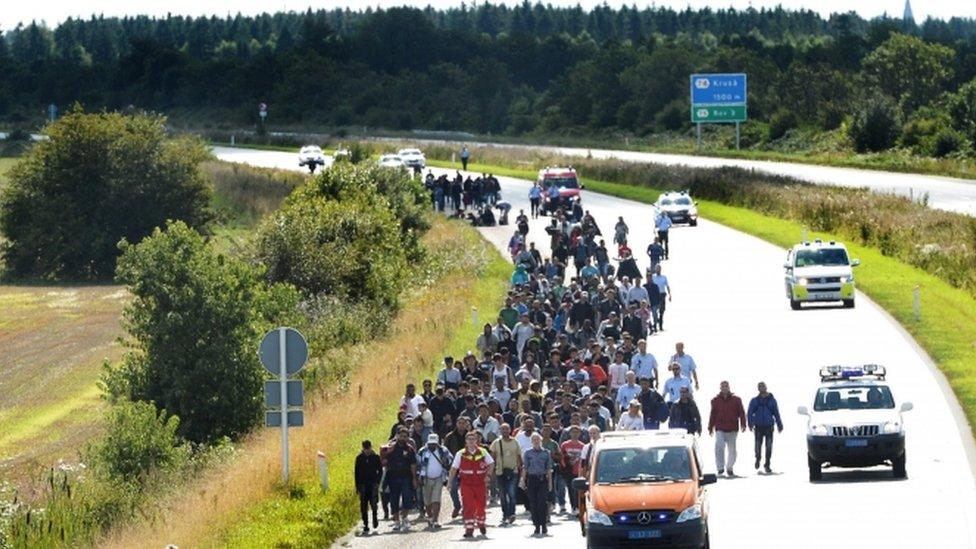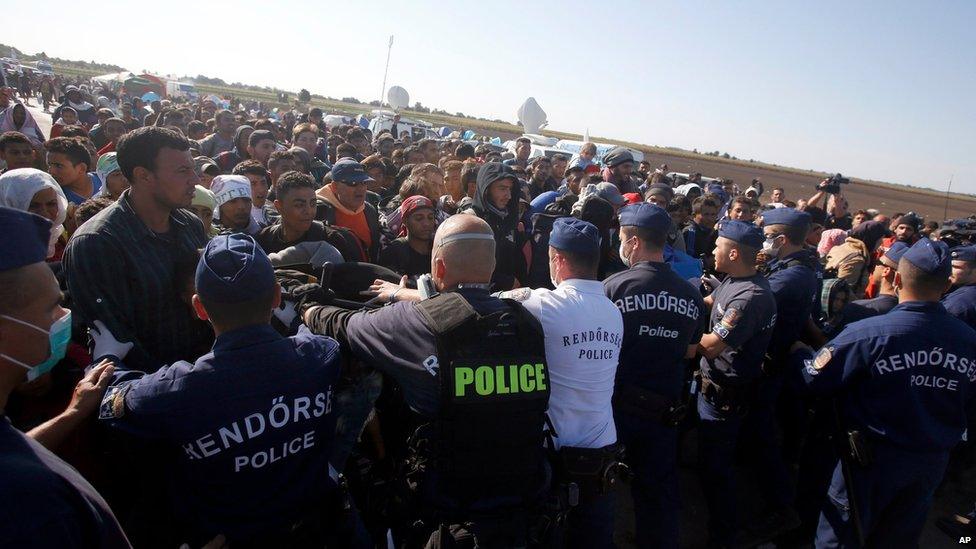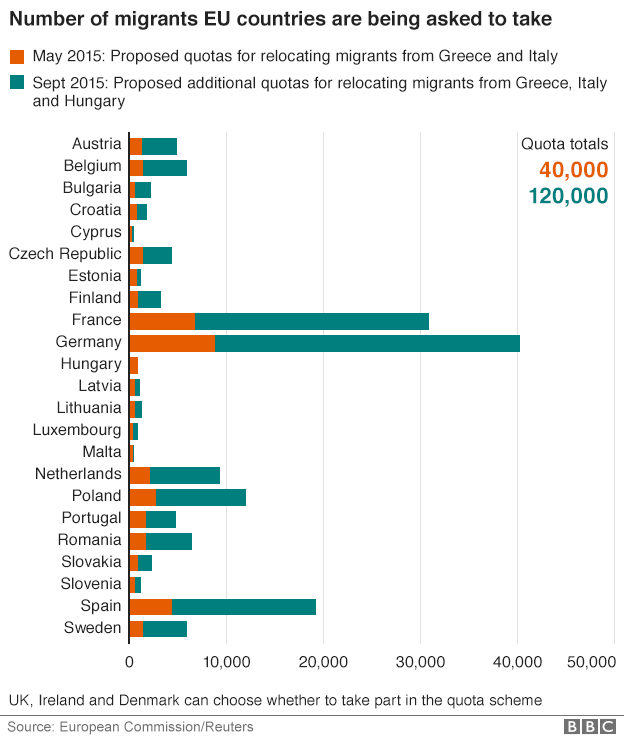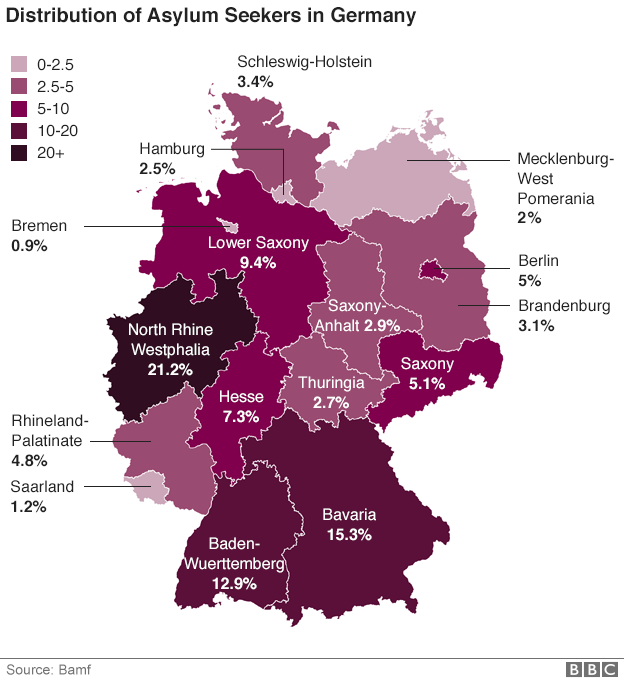Migrant crisis: EU's Juncker announces refugee quota plan
- Published
EC President Jean-Claude Juncker: "I'm strongly in favour of allowing asylum seekers to work and to earn... whilst their applications are being processed"
European Commission President Jean-Claude Juncker has announced plans that he says will offer a "swift, determined and comprehensive" response to Europe's migrant crisis.
Under the proposals, 120,000 additional asylum seekers will be distributed among EU nations, with binding quotas.
It comes after a surge of thousands of mainly Syrian migrants pushed north through Europe in recent days.
Mr Juncker told the European Parliament it was "not a time to take fright".
Germany, the main destination for many migrants, supports quotas, but some EU countries oppose a compulsory system.
The BBC's Mark Lowen spoke to a family from Iraq who lost their son when a smuggler's boat capsized
Mr Juncker's plans were set out in a "state of the union" annual address, external in which he outlined the priorities of the European Commission.
He opened his speech by admitting the European Union was "not in a good situation. There is a lack of Europe in this union, and a lack of union in this union".
He said tackling the crisis was "a matter of humanity and human dignity. It is true that Europe cannot house all the misery in the world. But we have to put it into perspective.
"This still represents just 0.11% of the EU population. In Lebanon refugees represent 25% of the population."

A group of migrants crossed into southern Denmark from Germany, forcing the closure of a motorway

Migrants in Roszke, southern Hungary, jostled again with police on Wednesday as they tried to leave a makeshift camp
The mass migration has seen those seeking an end to persecution, conflict and hardship travel from Turkey across the sea to Greece, through Macedonia and Serbia, and then to Hungary from where they aim to reach Austria, Germany and Sweden.
On Wednesday, Denmark suspended all rail links with Germany and shut a section of motorway after migrants crossed the border and began walking north, apparently trying to reach Sweden.
In southern Hungary, migrants on the border with Serbia broke through police lines at the Roszke camp, forcing the closure of the M5 highway.

UK to resettle 20,000 migrants from countries neighbouring Syria by 2020, Ireland to relocate 3,480
Among Mr Juncker's proposals:
EU member states to accept their share of an additional 120,000 refugees, building upon proposed quotas to relocate 40,000 refugees which were set out in May (though governments then only actually agreed to take 32,000)
A permanent relocation system to "deal with crisis situations more swiftly in the future"
Commission to propose list of "safe countries" to which migrants would generally have to return
Efforts to strengthen the EU's common asylum system
A review of the so-called Dublin system, which states that people must claim asylum in the state where they first enter the EU
Better management of external borders and better legal channels for migration
"It's 160,000 refugees in total that Europeans have to take into their arms and I really hope that this time everyone will be on board - no rhetoric, action is what is needed," he told MEPs.
The new plans would relocate 60% of those now in Italy, Greece and Hungary to Germany, France and Spain.
The numbers allocated to each country would depend on GDP, population, unemployment rate and asylum applications already processed.
Countries refusing to take in migrants could face financial penalties.

Next steps for EU leaders:
14 Sept: Special meeting of EU interior ministers on refugee crisis, with Juncker proposals on agenda
15-16 Oct: EU leaders' summit, with refugee crisis high on agenda. European Parliament then to decide on any new asylum measures with EU governments
Early 2016: EU proposals for better management of legal migration to EU due
What next for Germany's asylum seekers?
Peston: Why Germany needs migrants more than UK
What can the EU do to solve the crisis?

Spain on Wednesday said it would accept a quota of almost 15,000 extra migrants migrants set by EU.
However Mr Juncker's proposals was criticised by both the Czech Republic and Slovakia.
Czech Prime Minister Bohuslav Sobotka said compulsory quotas were "not a good solution", while his Slovak counterpart called them "irrational".
Poland and Romania have also opposed the idea, although Poland has agreed to take in more migrants.
France welcomed the first of 1,000 migrants it has pledged to take from Germany, having committed to receive 24,000 migrants over two years.
A Hungarian camerawoman has been sacked after being accused of tripping up fleeing migrants
In a separate development Australia has announced plans to take in 12,000 Syrian refugees.
Germany has welcomed Syrian migrants, waiving EU rules and saying it expects to deal with 800,000 asylum seekers this year alone - though not all will qualify as refugees and some will be sent back.
German Chancellor Angela Merkel said on Wednesday that Germany needed to learn from its mistakes in labelling incomers in the post-war period as "Gastarbeiter" or "guest workers" - with the implication that they were not permanent residents.
Many of the refugees it expects in future "will become new citizens of our country", she said.



A note on terminology: The BBC uses the term migrant to refer to all people on the move who have yet to complete the legal process of claiming asylum. This group includes people fleeing war-torn countries such as Syria, who are likely to be granted refugee status, as well as people who are seeking jobs and better lives, who governments are likely to rule are economic migrants.
